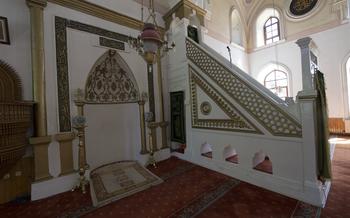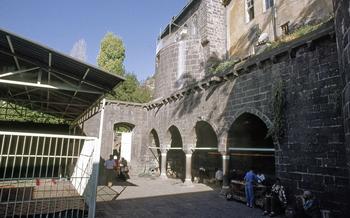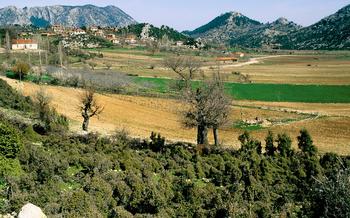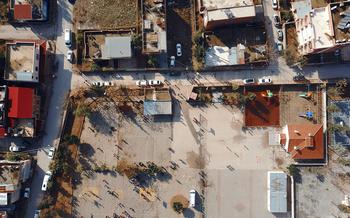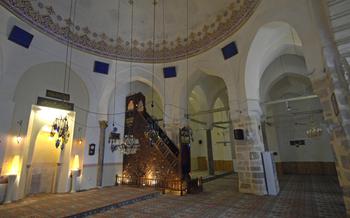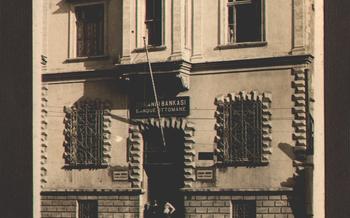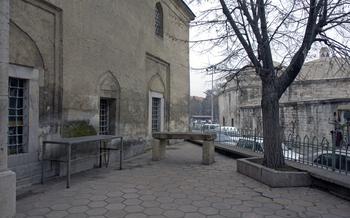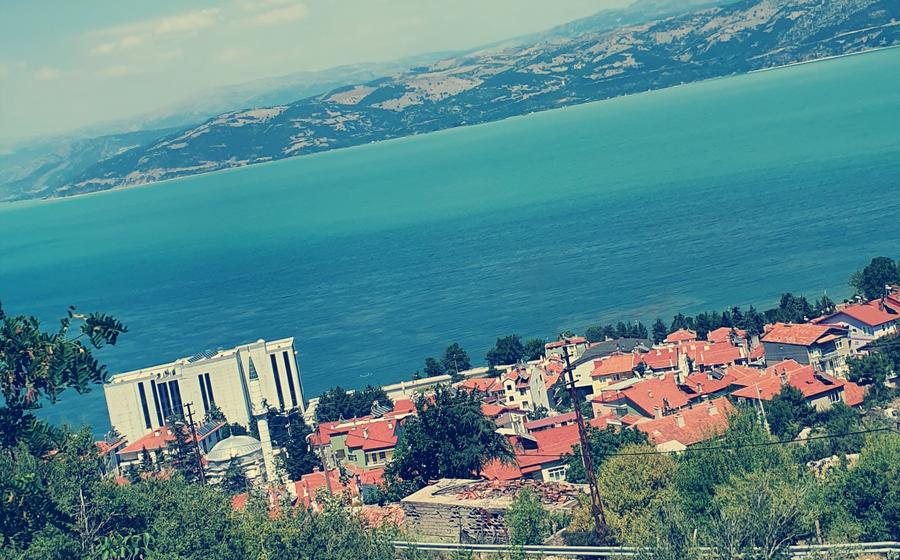
Hızırbey Mosque
- The Hızırbey Mosque: A Stunning Masterpiece
- Location and Accessibility
- Visiting Hours and Dress Code
- Exploring the Mosque's Exterior
- Stepping Inside the Prayer Hall
- Unveiling the Hidden Gems
- Surrounding Area and Nearby Attractions
- Capturing the Perfect Shot
- Local Traditions and Etiquette
- Suggested Tours and Itineraries
- Cost and Budget Tips
- Hassle-Free Visit: Advance Planning and Tips
- When to Visit: Weather and Seasons
- Insider Tip: Hidden Rooftop Viewpoint
The Hızırbey Mosque: A Stunning Masterpiece
In the heart of Isparta, Turkey, stands the Hızırbey Mosque, a magnificent architectural marvel that captivates hearts and souls. This 15th-century masterpiece, built during the Anatolian Beyliks period, is a testament to the region's rich cultural heritage and exquisite craftsmanship. The mosque holds a special place in the city's identity, serving as a spiritual and cultural hub for locals and visitors alike.
The Hızırbey Mosque showcases a blend of Seljuk and Ottoman architectural styles, creating a unique and harmonious ensemble. Its exterior facade is adorned with intricate stone carvings and calligraphy, while the interior boasts a vast prayer hall adorned with vibrant tilework, an ornate mihrab, and a delicate pulpit. Each element of the mosque's design is a testament to the skill and artistry of its creators, reflecting the deep-rooted traditions of Anatolian architecture.
Beyond its architectural beauty, the Hızırbey Mosque holds significant historical and cultural value. It has served as a center for religious worship, education, and community gatherings for centuries, playing a vital role in shaping the city's spiritual and social fabric. The mosque's enduring legacy continues to inspire awe and reverence among visitors who come to marvel at its grandeur and immerse themselves in its spiritual ambiance.
Location and Accessibility
The Hızırbey Mosque is situated in the heart of Isparta, Turkey, at the intersection of Atatürk Caddesi and Hızırbey Mahallesi Sokak. It stands as a prominent landmark just a short walk away from the city's main square, Cumhuriyet Meydanı. The mosque's central location makes it easily accessible by foot while exploring the city center.
For those arriving by car, there are limited parking options available on the streets surrounding the mosque. It is advisable to arrive early or consider utilizing public transportation to avoid any parking challenges. The Isparta Belediye Otogarı (bus station) is conveniently located within walking distance, offering regular bus services to and from major cities and towns in the region.
Alternatively, taxis are readily available and provide a convenient option for getting to the mosque from any point in Isparta. The friendly locals can assist in hailing a taxi or providing directions to the mosque.
Visiting Hours and Dress Code
The Hızırbey Mosque welcomes visitors during specific hours to ensure the smooth conduct of religious services and maintain a serene atmosphere. Tourists and worshippers are welcome to visit the mosque within these designated time slots.
Visiting Hours:
- Weekdays (Monday to Friday): 9:00 AM to 12:00 PM and 2:00 PM to 5:00 PM
- Weekends (Saturday and Sunday): 10:00 AM to 12:00 PM and 2:00 PM to 4:00 PM
Dress Code:
- The Hızırbey Mosque, like many religious sites, expects visitors to dress respectfully and modestly.
- For men, long pants and a shirt with sleeves are appropriate attire.
- Women are requested to cover their heads with a scarf or shawl and wear long, loose-fitting clothing.
Etiquette and Behavior:
- Visitors should maintain a respectful demeanor within the mosque, speaking softly and avoiding disruptive behavior.
- Photography is allowed with permission from the mosque's staff, but using flash or disturbing worshippers is strictly prohibited.
- Non-Muslims are welcome to visit the mosque during non-prayer times, but they should avoid entering the prayer hall during religious services.
Guided Tours and Audio Guides:
- Guided tours of the mosque are available upon request, providing visitors with in-depth insights into its history, architecture, and significance.
- For those who prefer self-guided exploration, audio guides are available in multiple languages, offering a personalized and informative experience.
Exploring the Mosque's Exterior
As you approach the Hızırbey Mosque, the grand entrance with its arched doorways commands attention. Marvel at the intricate stone carvings adorning the façade, each detail a testament to the skill of the artisans who crafted them. The calligraphy above the entrance, in graceful Arabic script, adds a touch of elegance and spirituality.
Look up to admire the minaret, a slender tower that rises towards the sky. Its intricate design and delicate ornamentation showcase the architectural prowess of the mosque's builders. The minaret's height offers a symbolic connection between heaven and earth, inviting the faithful to ascend towards the divine.
Take a moment to step into the serene courtyard, where the mosque's exterior beauty is complemented by the tranquil surroundings. The courtyard, with its manicured gardens and soothing water features, provides a respite from the bustling city, creating an atmosphere conducive to contemplation and reflection.
Stepping Inside the Prayer Hall
Entering the prayer hall of the Hızırbey Mosque is a transformative experience. The vastness of the main hall can't fail to inspire awe, as you stand beneath the grand dome that seems to reach towards the heavens. The intricate tilework and calligraphy that adorn the walls and ceiling create a symphony of colors and patterns, drawing the eye in every direction.
The mihrab, the niche indicating the qibla (direction of prayer), is a masterpiece in itself. Intricately carved from a single block of marble, it features delicate floral motifs and verses from the Quran. The pulpit, or minbar, is another highlight, with its finely carved wooden panels and intricate inlay work.
As you gaze upon these architectural wonders, a sense of serenity and tranquility envelops you. The prayer hall is a place of devotion and reflection, a sanctuary where the faithful can connect with their creator. Whether you're a Muslim or not, it's impossible not to be moved by the beauty and spirituality of this sacred space.
Unveiling the Hidden Gems
Beyond the main prayer hall, the Hızırbey Mosque holds several hidden gems that offer a deeper glimpse into its history and cultural significance. Explore the mosque's library, a treasure trove of rare manuscripts and ancient texts that tell the story of Isparta's rich Islamic heritage. Discover the tarihi çeşme (fountain), a testament to the mosque's enduring legacy as a center of community life. Admire the intricate stained-glass windows that bathe the interior in a kaleidoscope of colors, casting a mystical glow upon the sacred space. Finally, delve into the museum dedicated to the mosque's history and artifacts, where you can trace its evolution through the centuries and uncover the stories of the people who have shaped its legacy.
Surrounding Area and Nearby Attractions
Beyond the awe-inspiring Hızırbey Mosque, Isparta offers a wealth of attractions that will enchant travelers seeking cultural immersion and natural beauty. Begin your exploration at the Isparta Museum, a treasure trove of artifacts that narrate the region's rich history, from ancient civilizations to modern times. Immerse yourself in the vibrant tapestry of Isparta Bazaar, a bustling marketplace where you can haggle for unique souvenirs, savor local delicacies, and experience the infectious energy of Turkish commerce.
Indulge your senses at the annual Gül Festival (Rose Festival), a celebration of the region's renowned rose cultivation. Witness the distillation process that transforms delicate rose petals into exquisite fragrances and essential oils. Stroll through fields of blooming roses, their heady scent filling the air, and participate in traditional festivities that honor this iconic flower.
Escape the urban buzz with a visit to the serene Kovada Lake, a picturesque natural wonder nestled amidst lush forests. Embark on a tranquil boat ride, marvel at the diverse birdlife that graces its shores, and soak in the breathtaking views of the lake's crystal-clear waters. The surrounding countryside offers a plethora of hiking trails, inviting you to immerse yourself in the region's unspoiled natural beauty.
Capturing the Perfect Shot
The Hızırbey Mosque offers a treasure trove of photographic opportunities for capturing its architectural grandeur and intricate details. To capture stunning images, consider the following tips:
-
Choose the Right Angle: Experiment with different angles to showcase the mosque's imposing facade, graceful domes, and soaring minaret. Position yourself to capture the harmonious blend of architectural elements and the surrounding cityscape.
-
Master the Lighting: Timing is crucial for capturing the best light. Visit during the "golden hours" (sunrise and sunset) when the mosque's exterior glows in warm hues. Utilize natural light to emphasize the intricate carvings and textures of the stonework.
-
Embrace Wide-Angle Lenses: Employ wide-angle lenses to capture the mosque's expansive scale and sweeping vistas. These lenses allow you to include more of the surrounding environment, creating a sense of depth and grandeur.
-
Avoid Distractions: Compose your shots carefully to eliminate distracting elements such as parked cars or crowds. Choose viewpoints that offer clean lines and uncluttered backgrounds to highlight the mosque's architectural beauty.
Local Traditions and Etiquette
The Hızırbey Mosque, like all religious sites, holds deep cultural significance for local residents. As a visitor, it's important to be respectful and mindful of local traditions and etiquette. Here are a few tips to ensure a harmonious and enriching experience:
Respectful Behavior: Upon entering the mosque, remove your shoes and maintain a quiet and reverent demeanor. Avoid loud conversations, laughter, or any actions that may disturb worshippers.
Modest Attire: Dress modestly, covering your shoulders and knees. Women may also consider covering their hair as a sign of respect.
Photography Etiquette: While photography is generally allowed in the mosque, always seek permission before taking photos of people or within the prayer area. Be mindful of not disrupting worshippers or capturing images that may be considered disrespectful.
Engaging with Locals: Locals are typically friendly and welcoming. Feel free to engage with them, ask questions, and learn about their customs. Be open to sharing your own experiences and showing genuine interest in their culture.
Local Hospitality: Hospitality is a key aspect of Turkish culture. If invited for tea or coffee, accept graciously. It's a wonderful opportunity to connect with locals and gain insights into their daily lives.
Suggested Tours and Itineraries
Incorporating the Hızırbey Mosque into your travel itinerary offers a rich and rewarding experience. Whether you prefer a self-guided tour or organized excursions, there are plenty of options to suit your interests and budget.
For a comprehensive exploration, embark on a self-guided walking tour of Isparta, starting from the historic mosque. Stroll through the charming streets, admiring the city's architectural heritage and vibrant atmosphere. Visit the Isparta Museum to delve into the region's captivating history and culture. Conclude your tour with a leisurely stroll through the bustling Isparta Bazaar, where you can shop for souvenirs and local delicacies.
If you prefer a guided experience, join organized tours that include the Hızırbey Mosque as part of a larger itinerary. These tours often combine visits to other notable attractions in the region, such as the scenic Kovada Lake, the ancient city of Sagalassos, or the mesmerizing Pamukkale travertines.
For those with limited time, consider a day trip from nearby cities like Antalya or Denizli. These organized tours typically depart early in the morning and return in the evening, allowing you to explore the mosque and other highlights of Isparta in a single day.
To make the most of your visit, plan your itinerary carefully, considering the mosque's opening hours and any special events or religious holidays that might affect your schedule. With its rich history, stunning architecture, and spiritual ambiance, the Hızırbey Mosque is a must-see destination for anyone seeking a deeper connection with Turkey's cultural and religious heritage.
Cost and Budget Tips
Visiting the Hızırbey Mosque is generally free of charge for tourists and worshippers alike. However, certain costs may arise depending on your preferences and activities. Guided tours, if available, may come with a nominal fee. Some visitors choose to hire a local guide for a more personalized and in-depth experience, which would require additional expenses. Furthermore, photography permits might be required for taking pictures inside the mosque; inquire about these fees at the entrance.
Budget-conscious travelers can explore the mosque's surroundings and immerse themselves in local culture at minimal cost. Stroll through the vibrant Isparta Bazaar, where you can find souvenirs and local products at affordable prices. Indulge in the region's famous Gül Festival (Rose Festival), which offers free or low-cost activities celebrating the area's rich rose-growing heritage. Accommodation and dining options near the mosque vary in price range; research and compare to find choices that suit your budget.
Hassle-Free Visit: Advance Planning and Tips
To ensure a smooth and enjoyable visit to the Hızırbey Mosque, advance planning is key. If you're visiting during peak season (June-August), it's advisable to book tickets or reserve spots for guided tours in advance to avoid long queues and disappointment. It's also worth checking the mosque's website or contacting local tourism offices for information on special events or religious holidays that might affect visiting hours.
When packing for your visit, remember to bring comfortable shoes, as you'll be doing a fair amount of walking. A light scarf or shawl is also recommended for modest dressing, as a sign of respect for local customs. Staying hydrated and protected from the sun is essential, especially during the hot summer months, so carry a water bottle and consider wearing sunscreen and a hat.
When to Visit: Weather and Seasons
Timing your visit to the Hızırbey Mosque and Isparta is crucial for a pleasant and fulfilling experience. The ideal time to explore this region is during the shoulder seasons, namely spring (April-May) and autumn (September-October). These months offer moderate temperatures, fewer crowds, and a chance to witness the changing landscapes in full bloom.
Summer (June-August) can be scorching, with temperatures soaring above 35°C (95°F). While the heat might not deter some visitors, it's worth considering the potential discomfort and larger crowds during this peak tourist season.
Winter (November-March) brings chilly weather, with temperatures dropping below 5°C (41°F). While the mosque remains open, visitors should pack warm clothing and be prepared for potential rain or snow.
To truly immerse yourself in local culture, plan your visit around one of the many festivals or events held throughout the year. The renowned Gül Festival (Rose Festival), held annually in May, celebrates the region's famed roses and features parades, exhibitions, and traditional performances.
Insider Tip: Hidden Rooftop Viewpoint
Uncover a secret perspective of Isparta and the Hızırbey Mosque by venturing to the hidden rooftop viewpoint within the mosque's minaret.
Ascend the narrow, winding stairs, feeling a sense of anticipation as you climb higher. Emerging onto the rooftop, you'll be rewarded with a breathtaking panorama that will leave you in awe.
From this unique vantage point, you can admire the intricate details of the mosque's domes, minarets, and courtyard, set against the backdrop of the city's skyline. The surrounding mountains and lush greenery add depth and beauty to the scene, creating a picture-perfect moment.
Capture the essence of your Isparta experience by snapping some incredible shots from this hidden gem. With minimal crowds and distractions, you can fully immerse yourself in the mosque's grandeur and capture images that will serve as lasting memories of your journey.
Remember to be respectful and mindful when visiting the rooftop viewpoint, as it is a sacred space for prayer and contemplation. Embrace the opportunity to connect with the history, culture, and spirituality of Isparta in this unique and unforgettable way.
